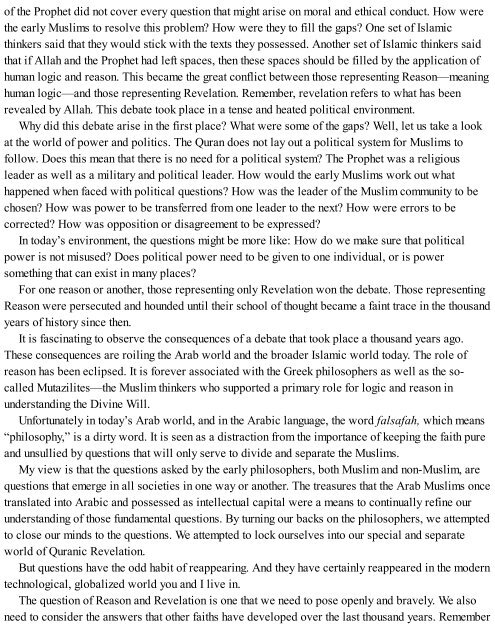1250119847
Create successful ePaper yourself
Turn your PDF publications into a flip-book with our unique Google optimized e-Paper software.
of the Prophet did not cover every question that might arise on moral and ethical conduct. How were<br />
the early Muslims to resolve this problem? How were they to fill the gaps? One set of Islamic<br />
thinkers said that they would stick with the texts they possessed. Another set of Islamic thinkers said<br />
that if Allah and the Prophet had left spaces, then these spaces should be filled by the application of<br />
human logic and reason. This became the great conflict between those representing Reason—meaning<br />
human logic—and those representing Revelation. Remember, revelation refers to what has been<br />
revealed by Allah. This debate took place in a tense and heated political environment.<br />
Why did this debate arise in the first place? What were some of the gaps? Well, let us take a look<br />
at the world of power and politics. The Quran does not lay out a political system for Muslims to<br />
follow. Does this mean that there is no need for a political system? The Prophet was a religious<br />
leader as well as a military and political leader. How would the early Muslims work out what<br />
happened when faced with political questions? How was the leader of the Muslim community to be<br />
chosen? How was power to be transferred from one leader to the next? How were errors to be<br />
corrected? How was opposition or disagreement to be expressed?<br />
In today’s environment, the questions might be more like: How do we make sure that political<br />
power is not misused? Does political power need to be given to one individual, or is power<br />
something that can exist in many places?<br />
For one reason or another, those representing only Revelation won the debate. Those representing<br />
Reason were persecuted and hounded until their school of thought became a faint trace in the thousand<br />
years of history since then.<br />
It is fascinating to observe the consequences of a debate that took place a thousand years ago.<br />
These consequences are roiling the Arab world and the broader Islamic world today. The role of<br />
reason has been eclipsed. It is forever associated with the Greek philosophers as well as the socalled<br />
Mutazilites—the Muslim thinkers who supported a primary role for logic and reason in<br />
understanding the Divine Will.<br />
Unfortunately in today’s Arab world, and in the Arabic language, the word falsafah, which means<br />
“philosophy,” is a dirty word. It is seen as a distraction from the importance of keeping the faith pure<br />
and unsullied by questions that will only serve to divide and separate the Muslims.<br />
My view is that the questions asked by the early philosophers, both Muslim and non-Muslim, are<br />
questions that emerge in all societies in one way or another. The treasures that the Arab Muslims once<br />
translated into Arabic and possessed as intellectual capital were a means to continually refine our<br />
understanding of those fundamental questions. By turning our backs on the philosophers, we attempted<br />
to close our minds to the questions. We attempted to lock ourselves into our special and separate<br />
world of Quranic Revelation.<br />
But questions have the odd habit of reappearing. And they have certainly reappeared in the modern<br />
technological, globalized world you and I live in.<br />
The question of Reason and Revelation is one that we need to pose openly and bravely. We also<br />
need to consider the answers that other faiths have developed over the last thousand years. Remember
















